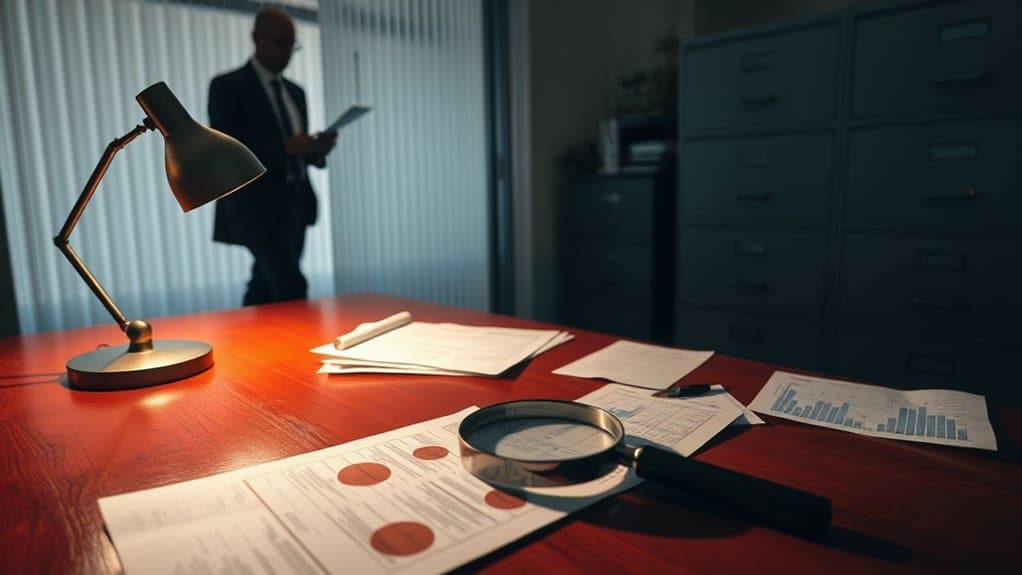Corporate fraud investigations blend sophisticated forensic accounting with advanced digital surveillance to combat modern financial crimes. Professional investigators employ multiple checkpoints, regular audits, and specialized detection software to uncover deceptive schemes that often exploit oversight gaps. Swift action and coordinated efforts between investigators and law enforcement maximize asset recovery potential. Understanding these evolving methodologies reveals the critical steps needed to protect corporate assets from increasingly complex threats.
Why Corporate Fraud Goes Undetected: Lessons From the Field
While most businesses implement basic financial controls, corporate fraud often remains undetected for years due to increasingly sophisticated schemes and misplaced trust in key personnel.
Perpetrators exploit gaps in oversight, manipulating accounting records and creating false documentation that can fool even experienced auditors. The 2009 case of an $8.7 million embezzlement illustrates how fraudsters operate beneath the radar, utilizing complex financial mechanisms to conceal their activities.
When companies rely too heavily on individual employees without implementing proper checks and balances, they become vulnerable to both Ponzi schemes and systematic theft of assets. To mitigate these risks, organizations should adopt robust anti-fraud reporting systems that enable real-time monitoring and detection.
The Modern Face of Ponzi Schemes and Financial Deception
The landscape of financial fraud has evolved significantly since Charles Ponzi’s original scheme in the 1920s. Today’s financial deceptions operate with sophisticated digital tools and complex networks, making detection increasingly challenging. Modern Ponzi schemes transcend geographical boundaries, affecting victims across local and national levels without discrimination. The most notorious example, Bernie Madoff’s scheme, demonstrated how these frauds can persist undetected within seemingly legitimate business operations. Despite technological advances in detection, perpetrators continue adapting their methods, exploiting trust and manipulating financial systems. This evolution demands heightened vigilance and professional investigation services to protect assets and uncover deceptive practices. The crucial role of corporate investigators helps organizations build trust and implement preventative measures against future fraud.
Building a Shield: Essential Prevention Strategies
Preventing corporate fraud requires implementing robust security measures and establishing comprehensive oversight protocols across all organizational levels.
Organizations must create multiple checkpoints for financial transactions, conduct regular audits, and maintain detailed documentation of all asset movements.
Essential strategies include employee background checks, separation of financial duties, and implementation of whistleblower policies.
Companies should invest in modern security systems and fraud detection software while fostering a culture of transparency and accountability.
Regular staff training on fraud awareness and reporting procedures completes a comprehensive defense against potential embezzlement and financial deception. Furthermore, employing financial forensics helps to analyze documents for anomalies, enhancing the detection of fraud before it escalates.
Recovery Options When Fraud Has Already Occurred
Despite the best preventive measures, corporate fraud can still occur, leaving organizations to navigate the complex process of asset recovery and damage control.
When fraud is discovered, swift action becomes paramount. Professional investigators can trace stolen assets, gather evidence for legal proceedings, and implement recovery strategies even years after the initial theft, as demonstrated in the 2009 case where $8.7 million was embezzled. Additionally, engaging specialized investigators who utilize surveillance equipment can significantly enhance the chances of successfully recovering lost assets.
Recovery options include asset tracking, legal action, and negotiated settlements. Organizations should engage licensed investigators who can coordinate with law enforcement while protecting the company’s interests throughout the recovery process.
Professional Investigation Services: Your First Line of Defense
Professional investigation services stand as a critical shield against corporate fraud, offering organizations comprehensive protection through expert surveillance, forensic accounting, and asset monitoring.
These specialized teams bring decades of experience in uncovering deceptive schemes, from simple embezzlement to complex Ponzi operations.
With locations across South Carolina, licensed investigators work meticulously to safeguard business assets before theft occurs. Their expertise proves invaluable in detecting suspicious patterns and preventing devastating losses.
When fraud is suspected, these professionals deploy sophisticated techniques to gather evidence, track perpetrators, and facilitate recovery efforts, ensuring businesses maintain their financial integrity. Additionally, understanding the importance of equitable distribution in asset recovery can enhance prevention strategies against fraud in businesses.
Conclusion
Corporate fraud remains a serious threat to business integrity and financial stability. Through professional investigation services, advanced detection methods, and robust prevention strategies, companies can better protect their assets from sophisticated schemes. While complete elimination of fraud may be impossible, organizations that prioritize vigilant oversight and swift response protocols position themselves to minimize losses and maintain stakeholder trust.
